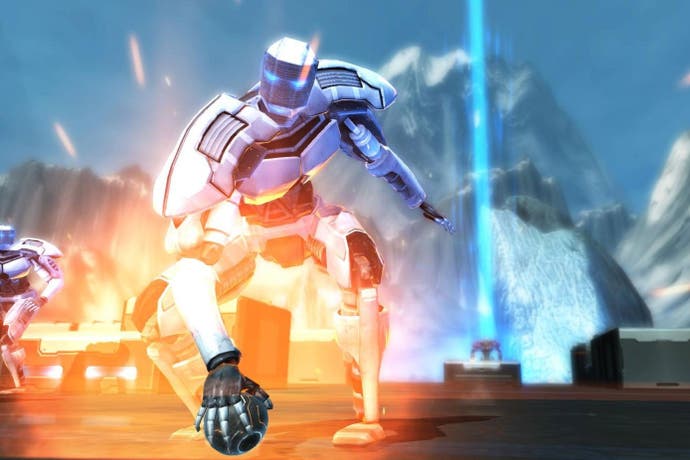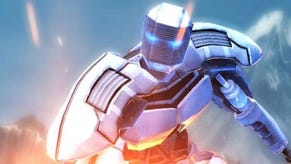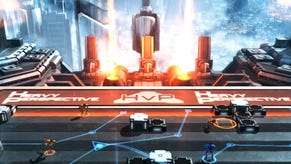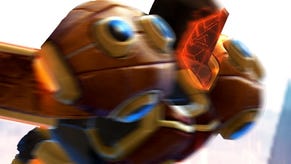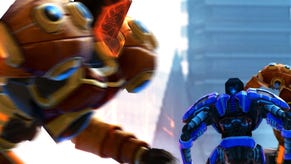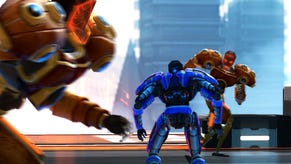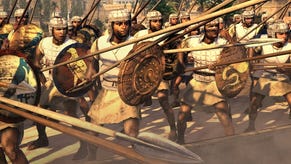Frozen Cortex review
The inhuman league.
Yesterday, something beautiful happened. Luck and insight collided, and the result was spectacular.
I was playing a Knockout game against stoical old Mentor Brack of Team Redemption. His guys had the ball, and he opted for a straight run down the left side of the field, bringing other players in close to defend against any blockers. Bold stuff, but potentially dangerous. I guessed he'd spend most of his defensive energy on the first half of the journey, and I was right, I felt a real jolt of happiness as I saw his ball carrier racing to the bottom half of the field where three of my guys had gathered at the goal to greet him. The thrill of it! The thrill of a careful plan foreseen and scuppered. Even better, though, Brack's careless play meant he had left all of his team - all five of them - wallowing on the far left of the field, which gave me something you almost never see in Frozen Cortex: an open path from the bottom of the pitch to the very top, over on the right. I couldn't believe it was happening. With the ball in my hand, I raced the whole length of that field, hitting four points zones and then landing a goal. (4 x 2) + 7: a 15 point play. "I need to profoundly rethink my defence," said Brack. He wasn't wrong. In the end, I beat him 31-0. You can tell a lot about the quality of a strategy game by trying to decide if a one-sided outcome still feels fair. This felt fair.
Like Frozen Synapse, Frozen Cortex is a turn-based tactics affair in which everybody's turns play out at once. You decide on your move at your own leisure, you position your pieces, you hesitate, you commit, and then the beautiful mess you've created unfolds - your actions, your opponent's actions, the whole hilarious disaster. It's a double-blind kind of deal, I think, and the fun of this approach comes from anticipation and adaptation. It's surprisingly tense, and surprisingly involving. It cuts right to the heart of strategy gaming.
Unlike the violent battler Frozen Synapse, however, Frozen Cortex is also a sports game - a futuristic sports game in which teams of lithe, heavy-fisted robots chuck a metal ball around in a neon-edged reworking of American Football that appears to play out on the roofs of skyscrapers. The shift away from the battlefield works wonders. With wit and a perfect ear for the twittering inanities of modern pundits, Frozen Cortex manages to offer not just a convincing sport, but also the wonderful crass, nerdy, heart-breaking human carnival that surrounds it - the churn of stats, provocation, and soap opera brinksmanship. If that wasn't enough, on the pitch, matches have been compacted into something stressful, muscular, and absolutely lacking in excess flab. There is nothing in Frozen Cortex that isn't stirring or heroic or deeply painful to behold: the showboating victories, the near-misses, the hilarious yawning failures. See, I sound like a pundit just talking about it. Over to you, Lawro.
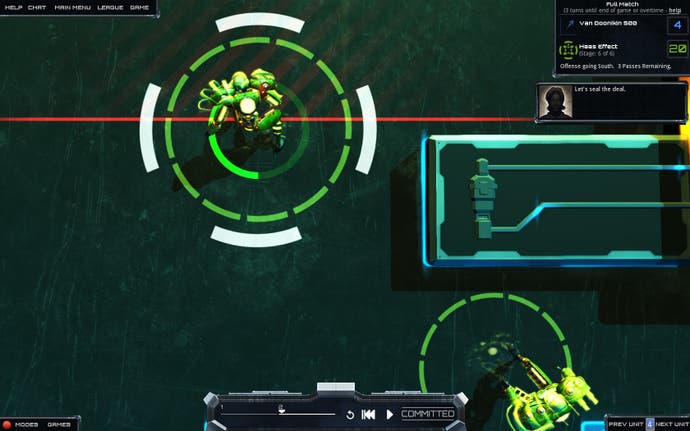
And it's all so simple. Frozen Cortex sees you and your opponent controlling teams of five robots each as they attempt to outscore their rivals. The main method of landing points is to get the ball to your enemy's endzone, but you can also pick up additional bonuses by running over randomly placed point markers on your way there, ball in hand - two points for each marker, compared to seven for a touchdown.
Alongside running, you can also pass, as long as you're passing forward, and this both hustles matches to a quick, action-packed conclusion and brings the level furniture into play - procedural arrangements of low walls you can throw over and high walls that you can't. Moving your team about or placing throws is a simple business of clicking on each player and dragging paths across the field for them to follow - you can even get them to pause before running - and the genius of the system is that you have all the time in the world to fuss about with the play you're making, moving your team around, watching a preview, trying adjustments. The one thing you can't do, of course, is know for certain the moves that your rival is making. You may commit to a tackle only to find that there's nobody actually there to be tackled anymore. You may have a great goal-line dash set up after a trivial throw, only to discover that the trivial throw itself was smartly intercepted.
Blocking and intercepts are all handled automatically when player and player or player and ball find themselves in the correct configuration, and there are deeper rules governing when you can throw, and how many times. Every game is kept short, switching to sudden death after 12 turns. It sounds like a lot to take in; ultimately, though, you can pick up the basic rules of Frozen Cortex in five minutes - leaving you with the rest of your life to untangle the clear-eyed madness those basic rules allow for,
This is a game for tinkerers, in other words, and the turn-based commit-when-you're-ready design is perfect for people who want to angle a run so it covers ground as efficiently as possible. Being a sport, there's always an enviably immediate objective, but you're always dealing with an enemy who will have a couple of options open to them, too - and you'll never have enough players at your disposal to prepare for all outcomes. In football, I gather this is called short blanket theory - there's a blanket, but the fun comes from the fact it will never cover everything. What it means here is that you spend a lot of time looking at the board and trying to work your way into the mind of your rival. When will he go left? How can I incentivise him to go left, and still have enough players in the correct positions to then throw right and score, directly under his nose?
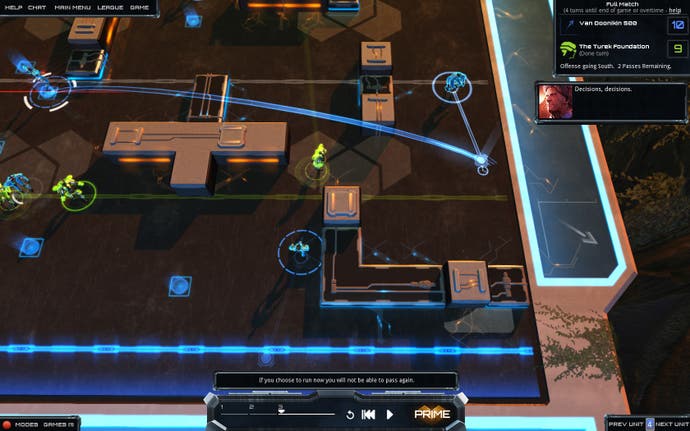
Simple inputs leading to complex outputs: this is strategy games. Happily, Frozen Cortex has you covered whether you want to go it alone or play online. Single-player offers a tight range of different leagues, and is capable of simulating the world of the sport itself: you can bet on matches, you can see the sports news roll past - "Are leg malfunctions contagious?" - and you can take calls from the grim oafs who manage the other teams as a story starts to emerge. The writing is surprisingly brilliant. My favourite rival coach is Colonel Levine, of the Armed Forces: she's strangely open about her failures and her insecurities. On the opposite side of the spectrum, I love Moderator GoatPause, the plump ninny who runs The Cloud Cartel. "I just saw an ant," he tells me halfway through a routing. "It was going diagonally, so I might do that."
Tying all this together are three commentators who represent a perfect congregation of the kind of mindless hair-spray-huffing blather you get from modern sports, all spun forward into the far future. There's the moon-faced idiot who speaks only in folksy truisms. There's the statistical idiot, who trusts the figures above all else. Then there's the idiot idiot - my favourite, inevitably - who drops one non-sequitur after another.
There are plenty of match-creation options, but the league to head for if you want to see single-player at its best is the Knockout league. Developer Mode 7's calling this a roguelike-like: one loss and you're out, but you can pick a new robot - with new abilities - each time you win, until you've dropped all your fumbling liabilities and replaced them with Cortex geniuses. Even on the easiest difficulty setting, it's tough going at first. It's dangerous to talk about the black box of AI when I scraped a dual science GCSE largely by scratching cheats into the back of a ruler, but I wonder whether a lot of Mode 7's success here comes down to the fact that the rules are so simple and the game arenas are so compact. Whatever it is, Frozen Cortex will give you a good game, and one that always feels like you're playing against a human.
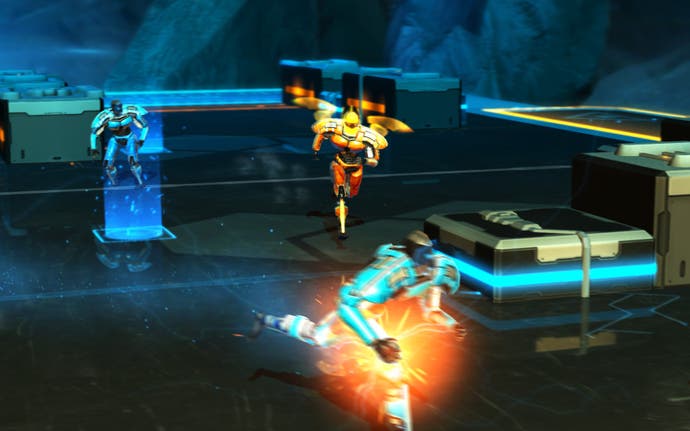
When you are playing against a human, of course, everything is even better. I'm not sure how well Frozen Cortex has sold, but while there's generally only between 20 or 30 players online, I've never had too much trouble getting a match. As this is turn-based, you can have a bunch of games going at all times, clicking in and out whenever a move is ready to be made. There's even a play-by-email mode which sends you a message when you have a turn ready: the height of civilisation in online games, if you ask me. It's fun against strangers but, like poker, another great double-blind game, Frozen Cortex comes into its own when you're playing a friend. A favourite old editor from my mag days has a terrible weakness for heroically long passes. I have a terrible weakness for forgetting his weakness.
In short: what a treat. A strategy game that's as much about bluffing and feints as is it is about vectors and placement and crowd control, a sports game in which every moment matters, and the annoyances are largely cosmetic - Delphic menus, a cinematic camera that can frame the action poorly in replays.
Speaking of replays, occasionally, on a very long pass, the ball will just freeze in the air, immobile as one turn ends and another begins. It's beautiful: so much attention focused on something so seemingly trivial. The ball hangs in space, while everyone on the ground rushes to switch up their plans to take into account where it's going to land. Adaptation, anticipation, creativity: this is what strategy is all about - and this is a game that really gets it.
